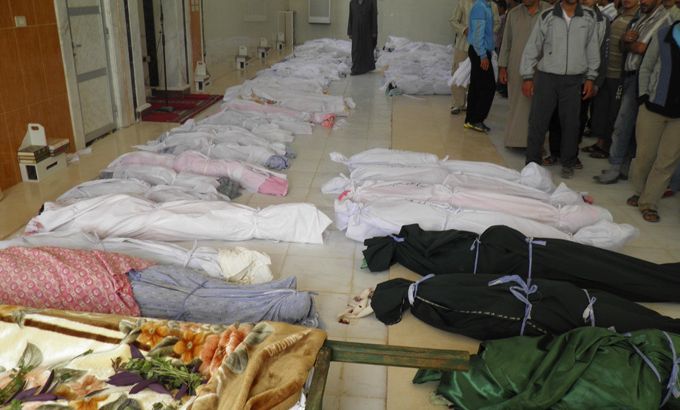Security Council debates response to Houla
UN body discusses massacre near Homs that has been blamed on government, although Damascus says it was caused by rebels.

The UN Security Council has met to discuss the recent massacre in the Syrian town of Houla, in which the UN says at least 108 people, including many children, were killed.
The UN has blamed Saturday’s attack on Syrian government forces firing artillery and tank shells at a residential area, but Damascus says the deaths were due to a rebel attack.
The meeting, which began on Sunday at 18:30 GMT, came after Britain and France proposed a statement condemning the massacre.
A senior Russian diplomat has also said the killing “deserves condemnation” but that it was too early to say who was to blame.
“The tragic events in Syria and the deaths of tens of people deserve condemnation. However it is necessary to seriously examine the causes of what happened,” Gennady Gatilov, Russia’s deputy foreign minister, said on Twitter.
“Let’s wait for the objective evaluations of the UN mission,” he said.
Al Jazeera’s Kristen Saloomey, reporting from UN headquarters in New York, said that the universal response there was that the killings in Houla deserve the condemnation of the Security Council, but added that “the devil is in the details”.
“Exactly who to condemn, and how to condemn them, remains open to debate,” our correspondent said.
The Syrian government has blamed “terrorists” for the killings on Friday and Saturday. Spokesman Jihad Makdissi said Damascus had opened an investigation and results were expected within three days.
“Not one Syrian tank went in” to Houla, Makdissi said.
Russian doubts
Gatilov’s remarks suggested Russia, which has backed Assad with weapons supplies and vetoes in the Security Council, was seeking to cast doubt on accounts the government was to blame.
“There is information that the nature of the wounds received by many of those who died are not the result of shelling,” he said.
Opposition activists said Assad’s forces shelled Houla after a protest and then clashed with fighters from the Sunni Muslim-led insurgency.
Bassam Imadi, a member of the Syrian National Council and formerly Syria’s ambassador to Sweden, told Al Jazeera that he feared a spate of revenge killings would plunge the country into further conflict.
“What we are afraid of is that those people on the ground will try to defend themselves, and perhaps … that people who are massacred, their relatives, their people, will ask for justice and perhaps revenge in the future. This might lead to a kind of conflict between people who are neighbouring each other,” Imadi said.
He urged the UN to “go beyond” issuing statements and to “do something effectively on the ground to stop such massacres”.
Activists say Assad’s “shabiha” militia, loyal to an establishment dominated by members of the minority Alawite sect, then hacked dozens of the victims to death, or shot them.
Russia blames armed opponents of Assad’s government for most of the violence that has persisted since a UN-backed ceasefire took effect on April 12, and says they are receiving foreign backing and arms.
Ban Ki-moon, UN secretary-general, joined Arab League-UN envoy Kofi Annan in releasing a statement condemning the massacre.
“This appalling and brutal crime, involving indiscriminate and disproportionate use of force, is a flagrant violation of international law,” the two officials wrote.
The White House said on Sunday it was horrified by the reports of brutal attacks in Houla, calling the acts further evidence of an inhuman and illegitimate Syrian government.
“These acts serve as a vile testament to an illegitimate regime that responds to peaceful political protest with unspeakable and inhuman brutality,” a White House spokesman said.